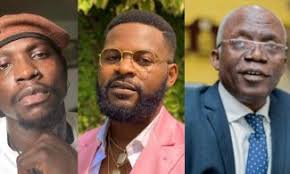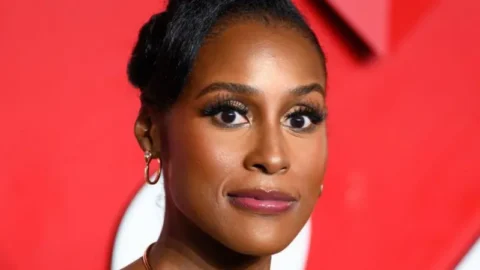A Lagos High Court has issued a ruling in the ongoing ₦1 billion defamation lawsuit brought by renowned human rights lawyer Femi Falana (SAN) and his son, popular rapper and activist Folarin Falana, widely known as Falz, against controversial social media personality Martins Otse, popularly called VeryDarkMan (VDM).
In a decision handed down this week, the court dismissed VDM’s preliminary objection and ordered him to pay ₦200,000 in damages — ₦100,000 each to the father and son — as part of the ongoing proceedings.
The judge ruled that VDM’s attempt to halt the case was “without merit” and affirmed that the suit would proceed.
The defamation suit arose from a viral video released by VDM earlier in 2024, in which he questioned the integrity and activism of the Falanas.
In the video, VDM accused the duo of hypocrisy, linking them to allegations made by crossdresser Idris Okuneye, also known as Bobrisky.
Bobrisky, in a widely circulated audio clip, claimed that unnamed EFCC officials collected ₦15 million from him to drop pending money laundering charges.
He further alleged that a Senior Advocate of Nigeria and his son were instrumental in facilitating the arrangement to prevent his imprisonment.
VeryDarkMan seized on the controversial audio, openly alleging that the individuals Bobrisky referred to were Femi Falana and his son, Falz.
These claims, which rapidly spread across social media platforms, were seen by many as a serious attack on the reputations of two of Nigeria’s most vocal and respected public figures.
In response, the Falanas filed a defamation lawsuit seeking ₦1 billion in damages, arguing that the statements made by VDM were false, damaging, and made with malicious intent.
Speaking through their legal representatives, the Falanas maintained that their reputations — built over decades of legal practice, public service, and social advocacy — had been wrongfully smeared.
“This is not merely about online gossip,” said one of their lawyers, Femi Akinyemi, outside the courtroom. “It is about holding people accountable for spreading falsehoods that could damage careers, credibility, and public trust.”
While Femi Falana himself was not present in court during the latest hearing, Falz was in attendance and appeared calm and composed as proceedings unfolded.
VDM, who was not in court either, was represented by his attorney, Marvin Omorogbe.
His legal team had argued that the Lagos court lacked jurisdiction, claiming that the events in question occurred outside the state. This formed the basis of his preliminary objection to the lawsuit.
However, the presiding judge ruled otherwise, emphasizing that since the video and its impact were largely felt within Lagos — where both claimants reside and work — the court had the legal authority to preside over the matter.
The ruling marks a significant step forward in what has become one of the most talked-about legal battles involving Nigerian public figures this year.
As the main defamation case moves ahead, legal experts and observers anticipate intense arguments from both sides.
Meanwhile, the court’s decision to award costs against VDM signals its stance on the seriousness of unfounded claims, especially those made in the digital space.
As the trial continues, all eyes will be on the outcome — and its potential implications for online speech and accountability in Nigeria.








